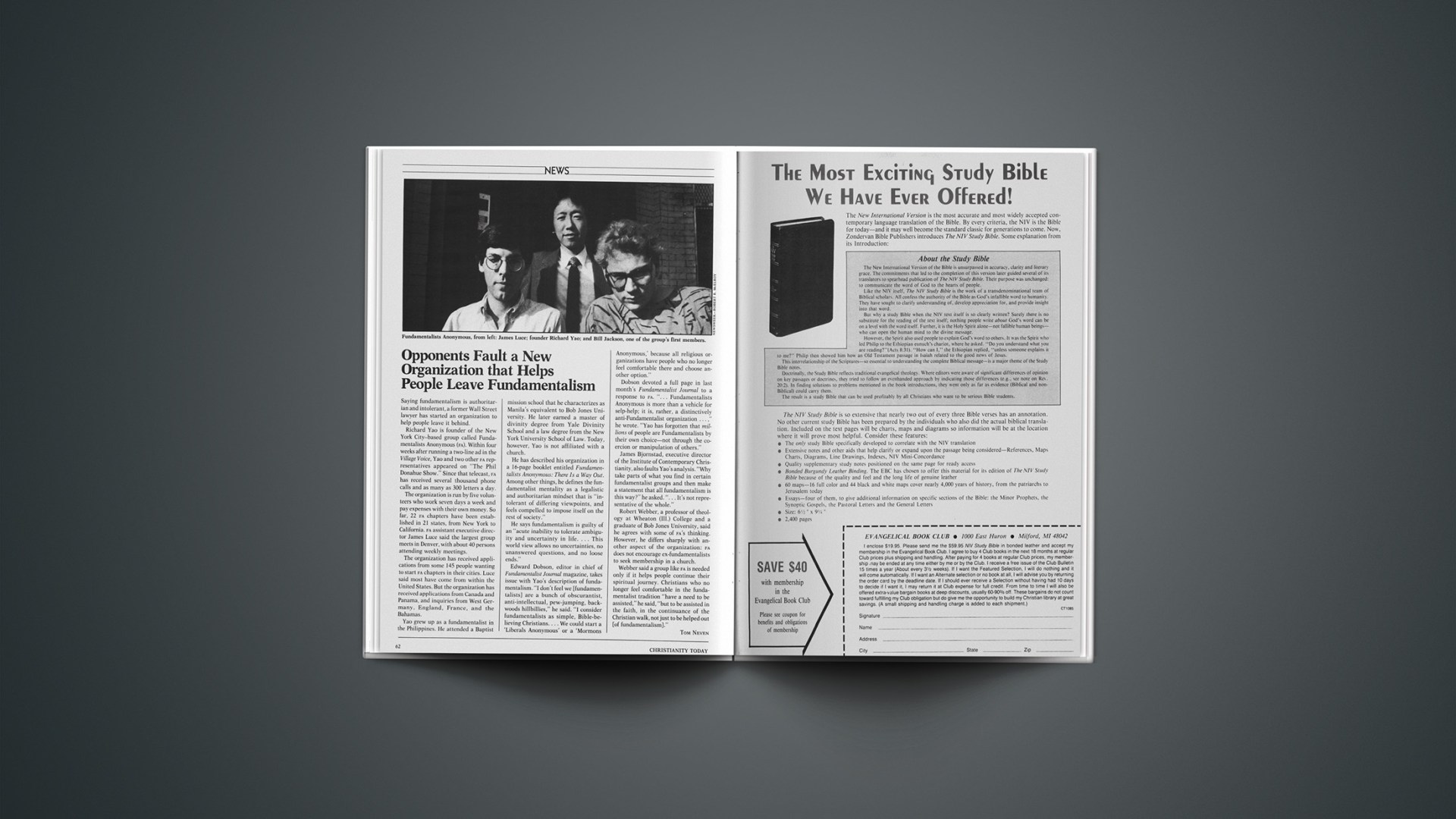Saying fundamentalism is authoritarian and intolerant, a former Wall Street lawyer has started an organization to help people leave it behind.
Richard Yao is founder of the New York City-based group called Fundamentalists Anonymous (FA). Within four weeks after running a two-line ad in the Village Voice, Yao and two other FA representatives appeared on “The Phil Donahue Show.” Since that telecast, FA has received several thousand phone calls and as many as 300 letters a day.
The organization is run by five volunteers who work seven days a week and pay expenses with their own money. So far, 22 FA chapters have been established in 21 states, from New York to California, FA assistant executive director James Luce said the largest group meets in Denver, with about 40 persons attending weekly meetings.
The organization has received applications from some 145 people wanting to start FA chapters in their cities. Luce said most have come from within the United States. But the organization has received applications from Canada and Panama, and inquiries from West Germany, England, France, and the Bahamas.
Yao grew up as a fundamentalist in the Philippines. He attended a Baptist mission school that he characterizes as Manila’s equivalent to Bob Jones University. He later earned a master of divinity degree from Yale Divinity School and a law degree from the New York University School of Law. Today, however, Yao is not affiliated with a church.
He has described his organization in a 16-page booklet entitled Fundamentalists Anonymous: There Is a Way Out. Among other things, he defines the fundamentalist mentality as a legalistic and authoritarian mindset that is “intolerant of differing viewpoints, and feels compelled to impose itself on the rest of society.”
He says fundamentalism is guilty of an “acute inability to tolerate ambiguity and uncertainty in life.… This world view allows no uncertainties, no unanswered questions, and no loose ends.”
Edward Dobson, editor in chief of Fundamentalist Journal magazine, takes issue with Yao’s description of fundamentalism. “I don’t feel we [fundamentalists] are a bunch of obscurantist, anti-intellectual, pew-jumping, back-woods hillbillies,” he said. “I consider fundamentalists as simple, Bible-believing Christians.… We could start a ‘Liberals Anonymous’ or a ‘Mormons Anonymous,’ because all religious organizations have people who no longer feel comfortable there and choose another option.”
Dobson devoted a full page in last month’s Fundamentalist Journal to a response to FA. “… Fundamentalists Anonymous is more than a vehicle for selp-help; it is, rather, a distinctively anti-Fundamentalist organization he wrote. “Yao has forgotten that millions of people are Fundamentalists by their own choice—not through the coercion or manipulation of others.”
James Bjornstad, executive director of the Institute of Contemporary Christianity, also faults Yao’s analysis. “Why take parts of what you find in certain fundamentalist groups and then make a statement that all fundamentalism is this way?” he asked. “… It’s not representative of the whole.”
Robert Webber, a professor of theology at Wheaton (Ill.) College and a graduate of Bob Jones University, said he agrees with some of FA’s thinking. However, he differs sharply with another aspect of the organization: FA does not encourage ex-fundamentalists to seek membership in a church.
Webber said a group like FA is needed only if it helps people continue their spiritual journey. Christians who no longer feel comfortable in the fundamentalist tradition “have a need to be assisted,” he said, “but to be assisted in the faith, in the continuance of the Christian walk, not just to be helped out [of fundamentalism].”










